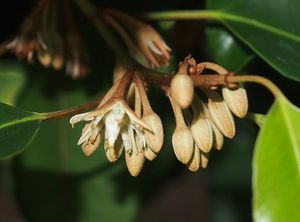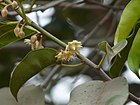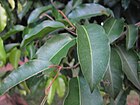Note: This is a project under development. The articles on this wiki are just being initiated and broadly incomplete. You can Help creating new pages.
Mimusops elengi - Bakula, Ranjal
Mimusops elengi is a medium-sized evergreen tree found in tropical forests in South Asia, Southeast Asia and northern Australia.[1]
Contents
- 1 Uses
- 2 Parts Used
- 3 Chemical Composition
- 4 Common names
- 5 Properties
- 6 Habit
- 7 Identification
- 8 List of Ayurvedic medicine in which the herb is used
- 9 Where to get the saplings
- 10 Mode of Propagation
- 11 How to plant/cultivate
- 12 Commonly seen growing in areas
- 13 Photo Gallery
- 14 References
- 15 External Links
Uses
Diarrhoea, Dysentery, Gum inflammation, Toothache, Gonorrhoea, Snakebites, Fever, Wounds, Sore throats.
Food
Mimusops elengi can be used in Food. Ripe fruits are eaten raw.[2]
Parts Used
Chemical Composition
DPPH1,1-diphenyl-2-picrylhydrazylABTS2,2′-azino-bis(3-ethylbenzthiazoline-6-sulphonic acid)MTT3-(4,5-dimethylthiazol-2-yl)-2,5-diphenyltetrazolium bromide[3]
Common names
| Language | Common name |
|---|---|
| Kannada | Ranjal |
| Hindi | Maulsari |
| Malayalam | Ilanni |
| Tamil | Magizhamboo |
| Telugu | |
| Marathi | NA |
| Gujarathi | NA |
| Punjabi | NA |
| Kashmiri | NA |
| Sanskrit | |
| English | Spanish cherry |
Properties
Reference: Dravya - Substance, Rasa - Taste, Guna - Qualities, Veerya - Potency, Vipaka - Post-digesion effect, Karma - Pharmacological activity, Prabhava - Therepeutics.
Dravya
Rasa
Kashaya (Astringent), Katu (Pungent)
Guna
Guru (heavy)
Veerya
Sheeta (cold)
Vipaka
Katu (Pungent)
Karma
Kapha, Pitta
Prabhava
Nutritional components
Mimusops elengi Contains the Following nutritional components like - Vitamin-A, Thiamine (B1), Riboflavin (B2), Niacin (B3), Pantothenic acid (B5), B6 and C; Calcium, Iron, Magnesium, Manganese, Phosphorus, Potassium, Sodium, Zinc[2]
Habit
Identification
Leaf
| Kind | Shape | Feature |
|---|---|---|
| Simple | Alternate | Petiole 1-2.5 cm long, glabrous, terete and canaliculate towards apex |
Flower
| Type | Size | Color and composition | Stamen | More information |
|---|---|---|---|---|
| Unisexual | 2-4cm long | White | 5-20 | Flowers white, in axillary fasicles |
Fruit
| Type | Size | Mass | Appearance | Seeds | More information |
|---|---|---|---|---|---|
| Berry | 7–10 mm | Berry, ellipsoid, reddish-brown when ripe | Single | {{{6}}} |
Other features
List of Ayurvedic medicine in which the herb is used
Where to get the saplings
Mode of Propagation
How to plant/cultivate
A plant of the hot tropical lowlands. It thrives in areas with perhumid or slightly seasonal rainfall types, but is most commonly found in seasonally dry habitats. Seed - best sown in individul containers in a shaded position, it usually germinates within 17 - 82 days, with a success rate of about 70 - 90%. Seedlings can be planted out when 20 - 30cm tall[6]. Mimusops elengi is available through January to March[2].
Commonly seen growing in areas
Tall grasslands, Meadows, Borders of forests and fields.
Photo Gallery
References
- ↑ Karnataka Aushadhiya Sasyagalu By Dr.Maagadi R Gurudeva, Page no:213
- ↑ 2.0 2.1 2.2 "Forest food for Northern region of Western Ghats" by Dr. Mandar N. Datar and Dr. Anuradha S. Upadhye, Page No.114, Published by Maharashtra Association for the Cultivation of Science (MACS) Agharkar Research Institute, Gopal Ganesh Agarkar Road, Pune
- ↑ Chemistry
- ↑ Plant morphology
- ↑ Ayurvedic preparations
- ↑ Cultivation details
External Links
- Ayurvedic Herbs known to be helpful to treat Diarrhoea
- Ayurvedic Herbs known to be helpful to treat Dysentery
- Ayurvedic Herbs known to be helpful to treat Gum inflammation
- Ayurvedic Herbs known to be helpful to treat Toothache
- Ayurvedic Herbs known to be helpful to treat Gonorrhoea
- Ayurvedic Herbs known to be helpful to treat Snakebites
- Ayurvedic Herbs known to be helpful to treat Fever
- Ayurvedic Herbs known to be helpful to treat Wounds
- Ayurvedic Herbs known to be helpful to treat Sore throats
- Herbs with Dried folaige used in medicine
- Herbs with Whole herb used in medicine
- Herbs with common name in Kannada
- Herbs with common name in Hindi
- Herbs with common name in Malayalam
- Herbs with common name in Tamil
- Herbs with common name in English
- Habit - Evergreen tree
- Index of Plants which can be propagated by Seeds
- Index of Plants which can be propagated by Cuttings
- Herbs that are commonly seen in the region of Tall grasslands
- Herbs that are commonly seen in the region of Meadows
- Herbs that are commonly seen in the region of Borders of forests and fields
- Herbs
- Ayurvedic herbs that don't have seed photos
- Sapotaceae








